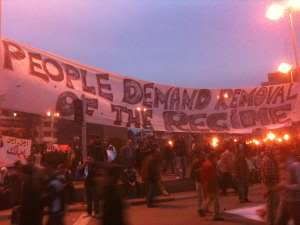 “The news is more evidence of the close ties between Israel, the United States and Mr Suleiman, who is tipped to replace Hosni Mubarak as Egypt’s president”, writes Christopher Hope in a February 09 article in the UK Telegraph, who explains his sourcing as “The close relationship has emerged from American diplomatic cables leaked to the WikiLeaks website and passed to The Daily Telegraph.”
“The news is more evidence of the close ties between Israel, the United States and Mr Suleiman, who is tipped to replace Hosni Mubarak as Egypt’s president”, writes Christopher Hope in a February 09 article in the UK Telegraph, who explains his sourcing as “The close relationship has emerged from American diplomatic cables leaked to the WikiLeaks website and passed to The Daily Telegraph.”
Mr Suleiman is Israel’s preferred candidate to replace 82-year-old Mr Mubarak. A secret hotline between Mr Suleiman and the Israelis was said to be “in daily use”, according to US diplomatic cables.
[…]
Mr Suleiman worked hard to position himself as the main Egyptian link with Israel. According to the cable, he was blocking attempts by the Israelis to form links with other members of the Cairo government.This was, according to Mr Diskin, because of Mr Suleiman’s “desire to remain the sole point of contact for foreign intelligence”.
The efforts paid off. In 2008, Mr Suleiman was named as Israel’s preferred successor to Mr Mubarak and the new secret direct hotline was in daily use. By early 2009, Dan Harel, deputy chief of staff at the Israel Defence Staff, was reporting that “on the intelligence side under Suleiman co-operation is good”.
[snip]
Mr Suleiman has already won the backing of Hillary Clinton, the US Secretary of State, to lead the “transition” to democracy after nearly three weeks of demonstrations calling for Mr Mubarak to resign.
As far as I know now, even after the military takover of Egypt this morning by Mohamed Hussein Tantawi, the head of the High Military Council that took control of Egypt on Friday, Omar Suleiman remains Egypt’s Vice President, presumably having taken over the duties and the powers of the President after Hosni Mubarak resigned this morning. This is an assumption I’m making here – if anyone has differing information about Suleiman’s role now, please let me know.
……….
Professor Gilbert Achcar of the School of Oriental and African Studies, London, grew up in Lebanon, and is currently Professor at the School of Oriental and African Studies (SOAS) of the University of London. His books include The Clash of Barbarisms: The Making of the New World Disorder, published in 13 languages, Perilous Power: The Middle East and U.S. Foreign Policy, co-authored with Noam Chomsky, and most recently the critically acclaimed The Arabs and the Holocaust: The Arab-Israeli War of Narratives.
In this interview from Feb. 08, 2011 Achcar talks with The Real News Network’s Paul Jay about the Egyptian protest movement, about the Egyptian Army, and about the illusions that many harbored and still harbor about the role and intentions of the Egyptian military in the sweeping revolutionary movement that developed over so many years of oppression of ordinary Egyptians and flowered into the mass movement we’ve all been watching the past couple of weeks:

 After a day of up and down rumors Thursday beginning with widespread anticipation in Egypt and around the world that Mubarak would step down, followed by a defiant speech Thursday evening in which he flatly refused the demands of protesters and said he would stay on as president of Egypt until his term ends in September, it now appears that Mubarak has indeed finally bowed to pressure and resigned.
After a day of up and down rumors Thursday beginning with widespread anticipation in Egypt and around the world that Mubarak would step down, followed by a defiant speech Thursday evening in which he flatly refused the demands of protesters and said he would stay on as president of Egypt until his term ends in September, it now appears that Mubarak has indeed finally bowed to pressure and resigned. UN Wire reports this morning:
UN Wire reports this morning: